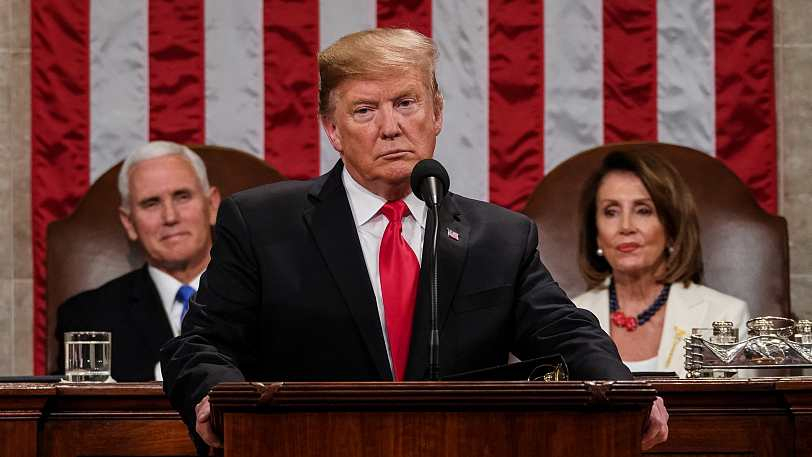Trump mixes calls for unity with combative jabs

U.S. President Donald Trump urged Americans to choose "greatness or gridlock" on Tuesday as he delivered a State of the Union address in which he mixed calls for bipartisanship with appeals to the Republican base and jabs at Democrats.
Read more:
Trump reached out by calling for lower healthcare costs, a proposal to eliminate HIV, and infrastructure spending, but also hit out at "partisan investigations," made remarks on divisive cultural issues and repeated controversial criticisms of illegal immigrants.
On his foreign policy, which Trump described as "principled realism," the president confirmed that he would meet Democratic People's Republic of Korea leader Kim Jong Un in Vietnam in late February.
Bipartisan call?
Trump's third speech to a joint session of Congress, delayed by one week following the 35-day government shutdown, opened with a call for unity that was quickly followed by an attack on "partisan investigations."
"We must reject the politics of revenge, resistance and retribution, and embrace the boundless potential of cooperation, compromise, and the common good," he said in the primetime address.
Looking out at a majority-Democrat audience of lawmakers for the first time, the Republican president declared that "an economic miracle is taking place in the United States, and the only things that can stop it are foolish wars, politics, or ridiculous, partisan investigations."
The president called for bipartisan support to lower the cost of healthcare and funding to eliminate HIV within the next decade, and drew applause from Republicans with a call for legislation to "prohibit the late-term abortion of children."
Trump highlighted bipartisan successes of the past two years, including criminal justice reform via the First Step Bill legislation, before calling on Republicans and Democrats to come together to tackle "an urgent national crisis" on "our very dangerous southern border."
With another shutdown looming next week unless Trump can strike a deal with Democrats over his proposed border wall, the president shied away from calling a national emergency to build the wall.
Instead, with Democratic Speaker Nancy Pelosi and Vice President Mike Pence seated behind him, he set out a plan closer to something that could be acceptable to Democrats, saying his proposal was for "a smart, strategic, see-through steel barrier-not just a simple concrete wall. It will be deployed in the areas identified by border agents as having the greatest need." However, he moved on to say, "simply put, walls work and walls save lives."
In a surprising remark, Trump said he wanted "people to come into our country in the largest numbers ever, but they have to come in legally," before again linking illegal immigration to murders, gang violence and crime, and argued tolerance for illegal immigration was "cruel."
Speaking in front of a record number of female House members – many of who wore white in a nod to the U.S. suffragist movement – he appeared surprised to receive applause from all sides when he declared that there were now more women in the workforce and more women in Congress than ever before.
The president went on to hit out at calls "to adopt socialism" in the U.S., an apparent reference to the "democratic socialists" who were elected in the 2018 midterms and a message likely to be repeated in the run-up to the 2020 elections.
Trump has made bipartisan calls before – in 2018's State of the Union, he called for "one American family" and a 1.5-trillion-U.S.-dollar infrastructure plan – with few results, and how willing the Democrats would be to give him victories that appeal to moderates is unclear.
Kim summit confirmed
Trump, who argued that his brand of foreign policy was "principled realism," claimed that the U.S. would be in a "major war" with the DPRK had he not been elected, and confirmed that he would meet with DPRK leader Kim Jong Un on February 27 and 28 in Vietnam.
The president said it was time for U.S. troops in Syria to return home – but did not repeat a timescale for withdrawal, which in December he said would be immediate. He added that in Afghanistan "it is time" to press for peace, and refocus U.S. troops on counterterrorism.
He floated the possibility of a new multilateral nuclear arms control agreement following his decision to withdraw the U.S. from the Intermediate-Range Nuclear Forces treaty. If a new pact was not agreed, he said the U.S. "will outspend and out-innovate all others by far."
Trump also argued his administration was "reversing decades of calamitous trade policies," and appealed for Congress to pass the United States reciprocal trade act and U.S.-Mexico-Canada agreement, the revised North American Free Trade Agreement.
He added that a new trade deal with China "must include real, structural change to end unfair trade practices, reduce our chronic trade deficit, and protect American jobs."